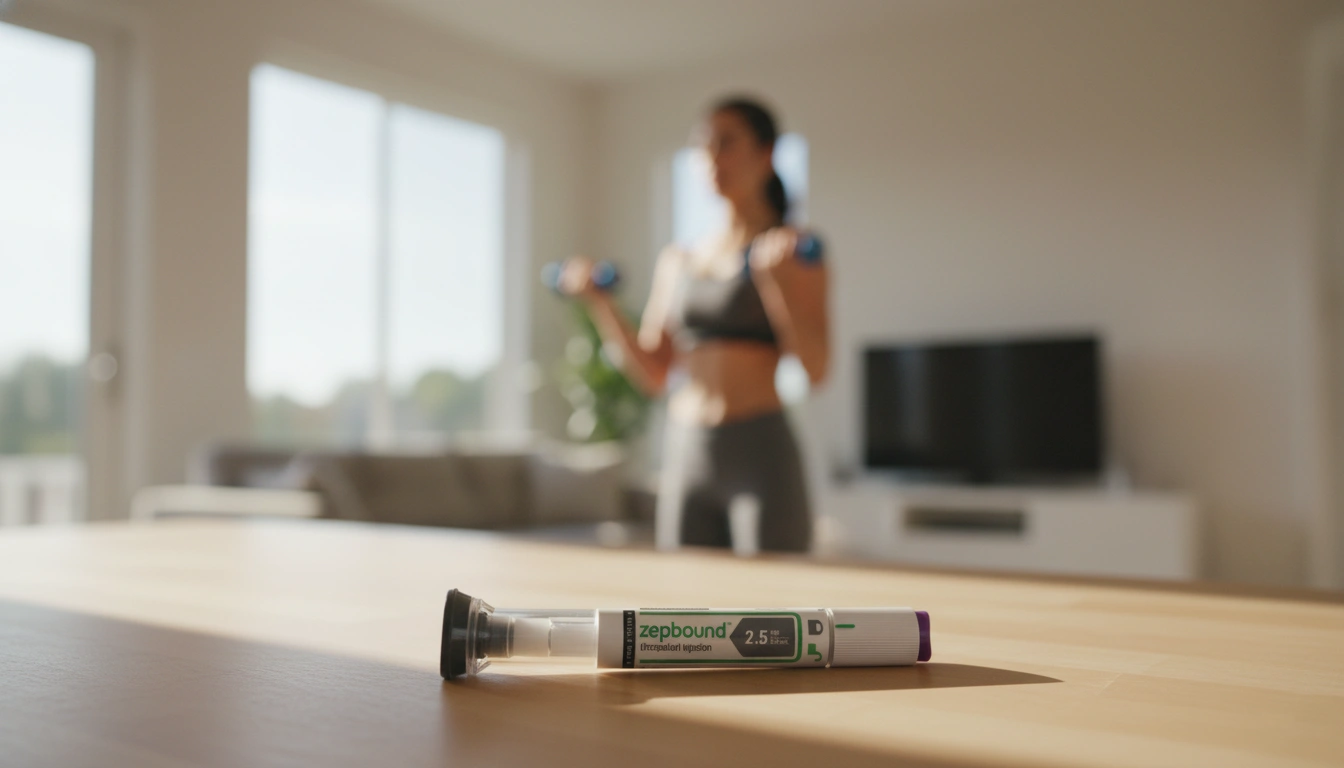Can You Stop Zepbound and Not Gain Weight?

Weight management can often feel like an uphill battle, especially when navigating the complex landscape of weight loss medications. With the recent approval of Zepbound (tirzepatide) by the FDA, many individuals are exploring this powerful tool in their weight loss journey. However, a pressing question arises: Can you stop Zepbound and not gain weight?
As we dive into this topic, we'll explore the mechanics of how Zepbound works, the implications of discontinuing its use, and strategies for maintaining weight loss after stopping the medication. By the end of this post, you’ll have a comprehensive understanding of what to expect and how to navigate your weight maintenance journey, whether you're currently on Zepbound or considering stopping.
Introduction
Did you know that approximately 70% of adults in the U.S. are classified as overweight or obese? This statistic underscores a pressing health issue that many face today. Obesity is not merely a cosmetic concern; it poses significant health risks, including diabetes, heart disease, and certain types of cancer. As a result, effective weight management solutions have become increasingly sought after, leading to the development and recent approval of medications like Zepbound.
Zepbound, a glucagon-like peptide-1 (GLP-1) agonist, has shown promising results in clinical trials, helping individuals lose a substantial amount of weight—averaging 20% of their body weight over 72 weeks. But what happens when you stop taking Zepbound? Will the weight come rushing back? This blog post aims to address these questions and equip you with strategies to maintain your weight loss after discontinuing the medication.
We will discuss:
- How Zepbound works and its role in weight loss.
- What happens physiologically when you stop taking Zepbound.
- The importance of lifestyle modifications in weight maintenance.
- Strategies to minimize weight regain after stopping Zepbound.
- Our personalized weight loss programs and how they can support your journey.
With this information, we hope to empower you to make informed decisions about your weight management journey.
Understanding How Zepbound Works
The Science Behind Zepbound
Zepbound functions by mimicking the effects of incretin hormones, which are involved in regulating blood sugar levels and appetite control. It helps to:
- Reduce Appetite: By acting on brain receptors that regulate hunger, Zepbound reduces cravings and the feeling of hunger, making it easier to consume fewer calories.
- Slow Digestion: The medication slows gastric emptying, meaning food stays in the stomach longer, contributing to a feeling of fullness after meals.
- Enhance Satiety: Zepbound increases feelings of fullness and satisfaction, making it less likely for individuals to overeat.
These mechanisms work synergistically to promote weight loss, making Zepbound a powerful ally for those struggling with obesity or overweight.
Clinical Evidence of Efficacy
In clinical trials, participants taking Zepbound experienced significant weight reductions. For instance, one study showed that participants lost an average of 20.9% of their body weight after 36 weeks of treatment. This dramatic weight loss can lead to improvements in health markers such as blood pressure and cholesterol levels.
However, the question of what happens after stopping the medication is crucial.
What Happens When You Stop Taking Zepbound?
Physiological Changes After Discontinuation
When Zepbound is stopped, its effects on appetite and satiety diminish. Research indicates that:
- Increased Appetite: Many individuals report an increase in appetite and cravings shortly after stopping the medication, as the natural hormonal balance shifts back to its pre-treatment state.
- Potential Weight Regain: Studies show that individuals who stop taking Zepbound may regain up to 14% of the weight lost within a year of discontinuation. This regain is not uniform; some may recover more weight than others based on factors like lifestyle and metabolic changes.
Individual Variability
It’s essential to understand that weight regain isn't guaranteed for everyone. Individual responses to stopping Zepbound can vary widely due to:
- Metabolic Differences: Each person's metabolism is unique, influenced by genetics, age, and overall health.
- Lifestyle Factors: Those who have established healthy eating and exercise habits may find it easier to maintain weight loss, while those who relied solely on medication may struggle.
The Role of Lifestyle Modifications in Weight Maintenance
The Importance of Diet and Exercise
Successful weight maintenance after stopping Zepbound heavily relies on dietary and lifestyle changes. Research consistently shows that individuals who engage in regular physical activity and adopt balanced diets are more likely to maintain their weight loss.
Key strategies include:
- Balanced Diet: Focus on whole foods rich in nutrients, such as fruits, vegetables, lean proteins, and whole grains. Limiting processed foods and sugars can help manage cravings and maintain satiety.
- Regular Exercise: Incorporating both aerobic and strength-training exercises can boost metabolism and help maintain muscle mass, which is crucial for overall health and weight management.
Building a Support System
Changing habits can be challenging, but having support can make a significant difference. Consider:
- Professional Guidance: Working with healthcare professionals, including registered dietitians and obesity specialists, can help create a personalized plan that suits your needs and lifestyle.
- Community Support: Joining support groups or engaging with friends and family can provide encouragement and accountability as you navigate your weight maintenance journey.
Strategies to Minimize Weight Regain After Stopping Zepbound
Gradual Discontinuation
Rather than stopping Zepbound abruptly, discussing a tapering plan with your healthcare provider may help mitigate potential weight regain. Gradually reducing the dosage may allow your body to adjust better to the absence of the medication.
Focus on Sustainable Changes
While medications like Zepbound can kickstart weight loss, sustainable change comes from lifestyle adjustments. Consider:
- Meal Planning: Preparing meals in advance can help you make healthier choices and avoid impulsive eating.
- Mindful Eating Practices: Paying attention to hunger cues and eating slowly can enhance the eating experience and prevent overeating.
- Setting Realistic Goals: Focus on small, achievable goals that promote gradual changes rather than drastic shifts that may lead to frustration.
Our Personalized Weight Loss Programs
At TrimRx, we understand that weight management is a personalized journey. Our approach combines cutting-edge telehealth innovations with medically supervised care to create effective weight loss solutions tailored to your individual needs.
Personalized Assessment Quiz
To embark on your journey with us, we invite you to take our free assessment quiz. This quiz helps determine your eligibility for our prescription weight loss medications and provides a personalized treatment plan designed to support your goals. You can access the quiz here.
Quick-Access Supplements
In addition to personalized medication plans, we offer supplements that do not require a quiz for immediate purchase. Products like GLP-1 Daily Support and Weight Loss Boost can provide additional support during your weight loss journey. Explore our quick-access supplements here and here.
Conclusion
Navigating the journey of weight loss and management can be complex, especially when considering medications like Zepbound. While it is common for individuals to regain weight after stopping the medication, the extent of regain can vary significantly based on individual factors and lifestyle choices. By focusing on sustainable changes—such as a balanced diet, regular exercise, and utilizing support systems—you can enhance your chances of maintaining weight loss.
As we continue to advocate for personalized, medically supervised weight loss solutions, we encourage you to engage with our resources at TrimRx. Together, we can navigate this journey toward healthier living.
FAQ
What should I expect if I stop taking Zepbound?
You may experience an increase in appetite and cravings shortly after discontinuing Zepbound, which can lead to weight regain.
How can I maintain my weight loss after stopping Zepbound?
Focusing on a balanced diet, regular physical activity, and establishing a support system can help you maintain weight loss.
Should I talk to my doctor before stopping Zepbound?
Yes, it is essential to consult your healthcare provider before making any changes to your medication regimen to ensure a safe and effective transition.
Can I take supplements during my weight loss journey?
Yes, our quick-access supplements like GLP-1 Daily Support and Weight Loss Boost can provide additional support as you work towards your weight loss and maintenance goals.
How can I get started with TrimRx?
Take our free assessment quiz to determine your eligibility for personalized weight loss programs tailored to your needs. Access it here.

Transforming Lives, One Step at a Time
Keep reading
Navigating Your Path: How Many Doses Are In Zepbound and What It Means for Your Health Journey
Curious how many doses are in Zepbound? Discover its weekly dosing schedule, available strengths, and titration process for effective weight loss. Learn more!
Navigating Your Zepbound Journey: Understanding Dosing and Expert Guidance
Wondering how to split doses of Zepbound? Learn why it’s unsafe & not recommended. Get expert guidance on Zepbound dosing for safe, effective weight loss with TrimRx. Click to learn more!
Understanding Zepbound Dosing: What is the Lowest Dose Available for Your Weight Loss Journey?
Curious what is the lowest dose of Zepbound available? Learn about Zepbound’s 2.5mg starting dose, titration, and safe use for weight loss. Get expert guidance!



